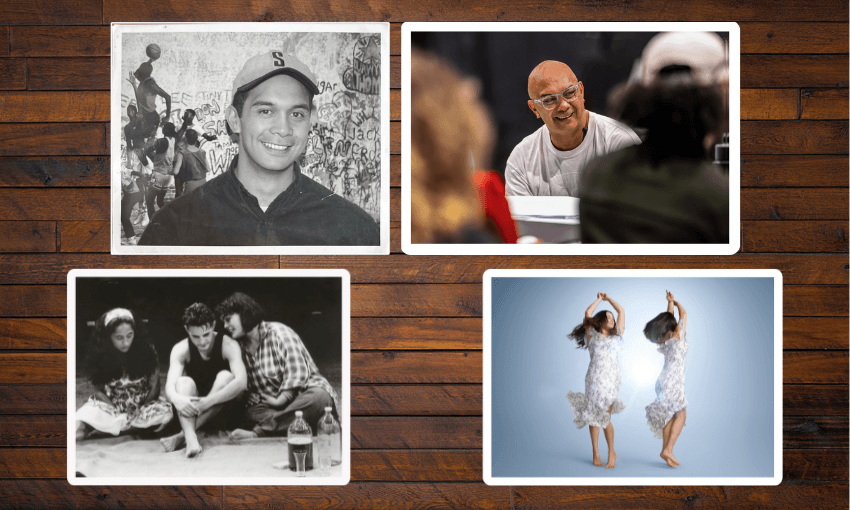It’s the eye-pop has been talked about more than just about any other TV segment in New Zealand history. But one crucial voice has stayed silent about it, until now. Hayden Donnell talks to Thingee about the on-screen medical nightmare that changed his life forever.
It started out like any other Son of a Gunn segment. Jason was prattling about a lost bike. Thingee replied: “It’s got two wheels, a seat, and some handleb…” He didn’t finish the sentence. His eye was already erupting from its socket, its black unseeing pupil spinning toward the concrete floor.
“Whoops”, Thingee said chirpily, sounding more like someone who’d dropped a teacup than suffered an explosion inside their face. Jason, clearly panicked, babbled about whether to wear a bike helmet around a dinosaur.
The shock wore off suddenly. Thingee let out a choked half-scream and disappeared down, down into hell. He emerged a few seconds later, right hand half-covering his gaping ocular crater.
It was radical. Electrifying. Disruptive. Twenty-two years on, people still recount recoiling in shock.
Famed songwriter Samuel Scott remembers it well.
“I was old enough to find the Thingee eye-popping moment more thrilling than traumatising,” he told me. “The fourth wall was broken. It was like performance art on live children’s television.”
So does my friend Claire.
“I watched that episode!” she said. “I screamed with laughter and my mum and brother came in and we all hysterically laughed as the whoever did the puppet work frantically searched for the eye which was rolling around on the floor or desk. Funniest bit of live TV.”
There’s just one problem with their stories: they’re not true.
Thingee’s eyeball never fled his skull on The Son of a Gunn Show. The show never went to air live. Few, if any, young children saw the clip.
If you’re one of the thousands of people who remembers watching the scene one sepia-toned afternoon with a mix of terror and exhilaration; you’re in the grips of a delusion. Your brain has betrayed you. Your memory is a lie.
TV aficionados have known the true story about the scene for some time. NZ On Screen’s description of “Thingee’s Eye Pop” notes the difference between people’s recollections and reality. “Although some swear they saw it happen live, the moment did not go to air until weeks after the event ” its description says. Jason Gunn himself was recently forced to debunk Thingee eye-pop truthers in a clip posted to his obscure YouTube channel.
But one person has remained silent about the real story of the scene so powerful it sparked national delirium: the one whose life has been shaped by it: Thingee himself.
That is, until now.
These days, Thingee lives in a cave on his home planet, where he returned in 1996, after a stint on What Now. He looks different to the way he did 22 years ago, when his ocular nerve suddenly severed and changed his life forever. His duck bill is graying around the edges. Those eyes – now both firmly settled in his head – are a little more watery than when he was still Jason’s frenetic foil.
One thing hasn’t changed: his voice. Thingee still sounds like a parrot who’s smoked too many cigars. His memory is in good shape too. He still remembers his detached eyeball cannoning toward the camera like it happened yesterday.
The real story of the eye-pop goes like this: Jason and Thingee used to pre-record three episodes of The Son of a Gunn Show in a day. They didn’t have a lot of time or budget, so sometimes when things went wrong they would adlib to see whether they could save the scene.
When Thingee’s eye embarked on its short journey into history, he tried to soldier on. Eventually though, producers decided the incident would be too terrifying for children. They cut it and reshot. It should have ended there.
It didn’t. When a bloopers show came asking for material a few weeks later, Son of a Gunn producers decided to send them the footage of Thingee’s cavernous cranial wound . A legend was born.
But how did Thingee even go back to work after accidentally disassembling his face? Only with the love, support, and questionable workplace practices of his friend and constant companion.
Thanks to Jason, and Thingee’s remarkable alien constitution, there was no permanent physical damage. He compares it to a “wardrobe malfunction”. “Like Janet Jackson’s” he said.
Emotional damage is another story. Though Thingee insists he’s fine with the scene’s notoriety, he still deals with a constant bombardment of other people’s self-deception.
“It’s one of the darndest things,” he said. “People say ‘I saw it live’ or they say ‘it was the funniest thing I saw on TV’. I tell them it didn’t happen… but I think they believe what they want to believe. They’re pretty sure that that’s what they saw and they think that’s happened.
“I did a lot of stuff. A lot of different programs. But the one thing people remember is your eye falling out.”
The reality is that people saw the scene on Eating Media Lunch, or YouTube, or even that old bloopers show. Somehow it wormed its way back through the folds of time into their childhood; a parasite burrowing its way into thousands of personal histories.
Thingee wants to set the record straight. To finally repress New Zealand’s false memory. To free himself of his association with our sham national childhood trauma.
This is official statement on the issue.



